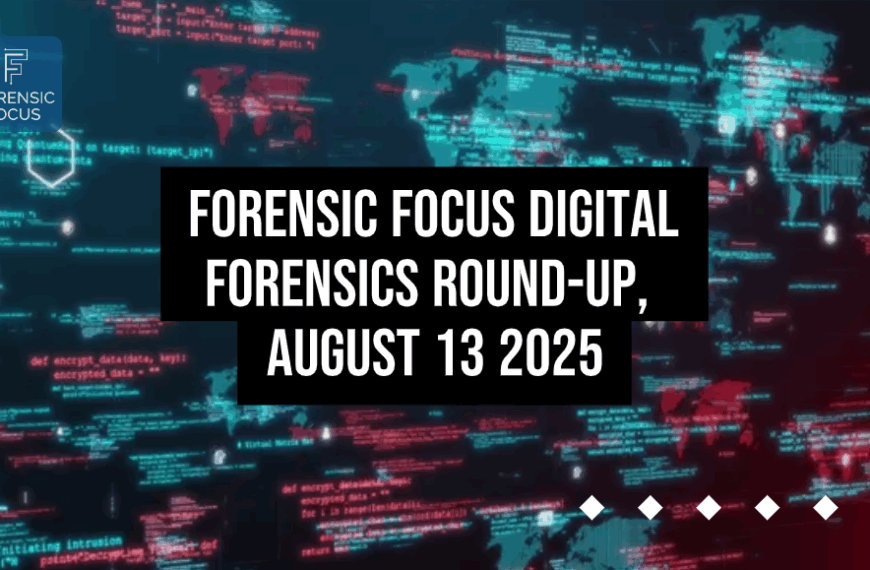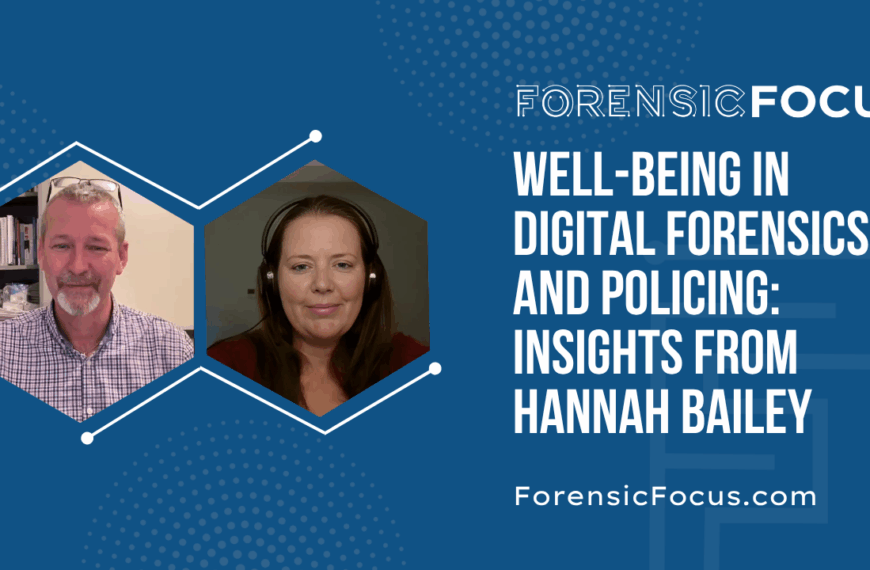by Paul Gullon-Scott BSc MA MSc MSc FMBPSS
On 12th June 2025, I had the privilege of taking part in a live webinar hosted by Adam Firman, Tech Evangelist at MSAB. We explored the often-overlooked mental health effects experienced by Digital Forensic Investigators (DFIs). The session welcomed approximately 160 participants worldwide, each bringing valuable insights, reflections, and heartfelt questions—clear signs of deep concern within the community about the psychological toll of this work.
One comment stood out for its painful truth: a participant shared that many DFIs, when seeking mental health support, are offered just six therapy sessions. This limit—common across UK services—is presented as a standard intervention, regardless of the depth or duration of trauma a professional may have endured.
Six Sessions Are Not Enough
In response, I shared something I now feel compelled to expand on more publicly: six therapy sessions are simply not enough. They cannot unpick years of complex psychological trauma, nor can they provide sustainable relief from PTSD, burnout, anxiety, or depression—conditions that are well documented in research.
A skilled therapist might use those initial sessions to create a safe space, build emotional stability, and help a client feel heard. But true healing—real, enduring recovery—requires time, commitment, and compassion. For me, it took 14 months of weekly intensive counselling before I began to feel like my old self again.
The Emotional Cost of the Job
Digital Forensic Investigators are the unsung heroes of digital crime investigations, routinely engaging with disturbing material. From indecent imagery of children to evidence of extreme violence, DFIs are exposed to content the average person would never have to witness—let alone analyse in detail for hours on end. This constant exposure changes your worldview. It does not leave you unscathed.
Research shows repeated exposure to traumatic digital material has cumulative effects on mental health. Prolonged contact with child sexual abuse material (CSAM), for example, is linked to higher levels of secondary traumatic stress, intrusive thoughts, emotional numbing, PTSD, and Complex PTSD. Previous studies confirm that DFIs report high rates of burnout, emotional exhaustion, and depressive symptoms—conditions that impair both professional performance and personal wellbeing.
The Illusion of Support
Offering six sessions may stem from good intentions—to make support accessible—but for those immersed in psychologically damaging content for years, this limit risks further harm. Short-term therapy can give the illusion of support while failing to meet actual needs.
Therapists often use the first few sessions to build rapport and assess the trauma’s scope. Many DFIs are emotionally guarded from years of compartmentalisation. For them, it can take weeks or months to open up. In this context, a six-session limit serves as triage, not treatment. At best, it starts the healing process. At worst, it reinforces the belief that their suffering isn’t worth more time.
One Size Doesn’t Fit All
Each person’s path to recovery is unique. Trauma doesn’t follow arbitrary timelines. One person might respond well to short-term CBT. Another may require over a year of EMDR, psychodynamic, or trauma-informed therapy to feel functional again.
In my case, therapy didn’t erase what I’d seen—those memories remain—but it taught me how to live alongside them. Therapy helped me reframe my experience, turning pain into insight, and helping me move forward with purpose.
A Personal Reckoning
When I began therapy, I was shattered, angry, and burned out. Over more than a year, with the help of a consistent, non-judgmental therapist, I began to rebuild myself. That journey was not linear. Some weeks brought breakthroughs. Others brought stalemates. At times, I wanted to give up. But that long-term support allowed me to rediscover who I was.
You wouldn’t send a soldier into battle without body armour—so why are DFIs being sent into digital battlegrounds without proper psychological protection? Share on XLooking back, I realise how much I had changed. I thought I was hiding my struggles well. But all I see now is the fear in the eyes of those who love me, watching me become withdrawn, irritable, emotionally numb—unreachable.
If my therapy had been cut off at six weeks, I might have internalised the message that my pain didn’t matter. I truly don’t want to imagine what might have happened. We cannot allow this to be the message DFIs receive.
The Stats Speak for Themselves
During the MSAB webinar, participants were asked: “Are you satisfied with the current level of mental health support?” Sixty-nine percent answered NO.
This speaks volumes. It shows that mental health provision is not keeping pace with the needs of the workforce. When support is offered, it’s often generic and inflexible. DFIs, who work tirelessly to protect others, are not being adequately protected themselves.
You wouldn’t send a soldier into battle without body armour—so why are DFIs being sent into digital battlegrounds without proper psychological protection?
Prevention Is Better Than Cure
In the UK, mental health provision is largely reactive—often only initiated when professionals begin to show signs of distress. But during the webinar, another question was asked: “Would a more proactive approach to mental health and wellbeing be helpful—for example, psychoeducation around the mental health issues you may face?”
An overwhelming 97% of participants said yes.
Given the rising volume and complexity of CSAM cases, why hasn’t mental health provision evolved? Equipping investigators to recognise and respond to psychological stressors—through self-care, peer support, or early access to therapy—could help reduce or even prevent long-term harm.
Where’s the Self-Care Training?
Investigators are routinely trained to use new forensic tools—but where are the courses on how to care for themselves?
Mental health must not be an afterthought or a crisis response. It must be a core component of training and professional development in digital forensics. We prepare investigators to face technical challenges; surely, we must also prepare them to manage emotional ones.
Real Support, Not Arbitrary Limits
Mental health support needs to be:
- Trauma-informed
- Role-specific
- Flexible in duration
A rigid cap of six sessions contradicts everything we know about trauma recovery.
Therapy is not a luxury for DFIs—it is a necessity. It enables professionals to process what they’ve witnessed, regulate their responses, and return to a place of psychological balance. The importance of long-term access cannot be overstated. It:
- Allows for deeper processing
- Fosters trust
- Provides stability
A Call to Action for Organisations
It’s time to remove arbitrary therapy limits for those in trauma-heavy roles. The psychological injuries DFIs endure are occupational hazards—just like physical injuries in frontline sectors.
A broken leg wouldn’t be expected to heal in six weeks without proper care. Why should complex trauma?
Organisations must review and improve their mental health policies. This could include:
- Funding extended therapy where clinically indicated
- Partnering with trauma-specialist clinicians
- Creating tiered support systems
- Promoting mental health as a preventative priority
A Message to DFIs
If you are struggling, please know this: your distress is not weakness. It’s a natural human response to inhuman material.
Seeking help is not a sign of failure—it is an act of courage. Speaking from my own experience, I understand how daunting it can feel. The idea of revisiting the cases that haunt your sleep, of putting words to the images that linger in your mind, can be terrifying.
Therapy isn’t about reliving trauma—it’s about learning how to live with it in a way that no longer changes who you are. It’s a space where you can begin to process, understand, and gradually let go of the weight you’ve been carrying.
With time, support, and self-compassion, you will come through this stronger, more grounded, and more connected to yourself and those who care about you.
You are doing incredibly important work—but your wellbeing matters just as much.
Please take that first step.
You deserve more than six sessions. You deserve care that meets you where you are, and stays with you for as long as you need.
If you take one thing from this article, please remember:
Every person heals at their own pace. Your pain is valid. Your recovery matters. You are not alone.
Paul Gullon-Scott BSc MA MSc MSc FMBPSS is a former Digital Forensic Investigator with nearly 30 years of service at Northumbria Police in the UK, specializing in child abuse cases. As a recognized expert on the mental health impacts of digital forensic work, Paul now works as a Higher Assistant Psychologist at Roseberry Park Hospital in Middlesbrough and is the developer of a pioneering well-being framework to support digital forensics investigators facing job-related stress. He recently published the research paper “UK-based Digital Forensic Investigators and the Impact of Exposure to Traumatic Material” and has chosen to collaborate with Forensic Focus in order to raise awareness of the mental health effects associated with digital forensics. Paul can be contacted in confidence via LinkedIn.







